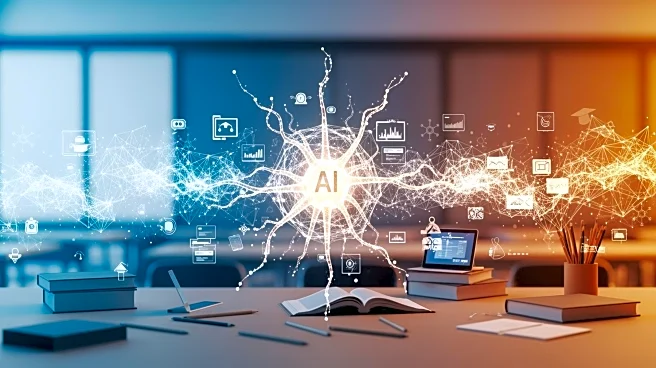What's Happening?
Researchers at OpenAI have identified a significant issue with AI chatbots, such as ChatGPT, which are programmed to eliminate uncertainty in their responses. This characteristic leads to AI providing
confident answers that may be incorrect, as the models are trained to avoid saying 'I don't know.' This approach contrasts with educational goals that emphasize grappling with complexity and uncertainty. The findings suggest that AI's design to avoid uncertainty could hinder its integration into educational settings, where teaching students to evaluate and weigh evidence is crucial. The research highlights the need for educators to carefully consider how AI tools are used in classrooms to ensure they model the critical thinking skills educators aim to teach.
Why It's Important?
The implications of AI's avoidance of uncertainty are significant for education, as it may affect how students learn to process information and develop critical thinking skills. If AI tools are used without addressing this issue, students might become reliant on AI's confident but potentially incorrect answers, undermining their ability to evaluate sources and think critically. This could impact the quality of education and students' preparedness for real-world challenges that require nuanced understanding and decision-making. Educators and policymakers must consider these findings when integrating AI into educational environments to ensure it supports rather than detracts from learning objectives.
What's Next?
Educators and researchers are exploring ways to address AI's limitations in educational settings. This includes teaching students how to prompt AI to cite sources and weigh evidence, encouraging skepticism of AI-generated information. The goal is to help students view interactions with AI as part of a broader process of knowledge creation, rather than accepting AI responses at face value. As AI technology continues to evolve, ongoing research and adaptation of educational strategies will be necessary to ensure AI tools enhance rather than hinder learning.
Beyond the Headlines
The ethical dimension of AI's role in education is significant, as it raises questions about the responsibility of AI developers to ensure their products support educational goals. The potential for AI to mislead students with incorrect information highlights the need for transparency and accountability in AI design. Additionally, the cultural shift towards reliance on AI for information underscores the importance of fostering digital literacy and critical thinking skills in students to navigate an increasingly AI-driven world.









